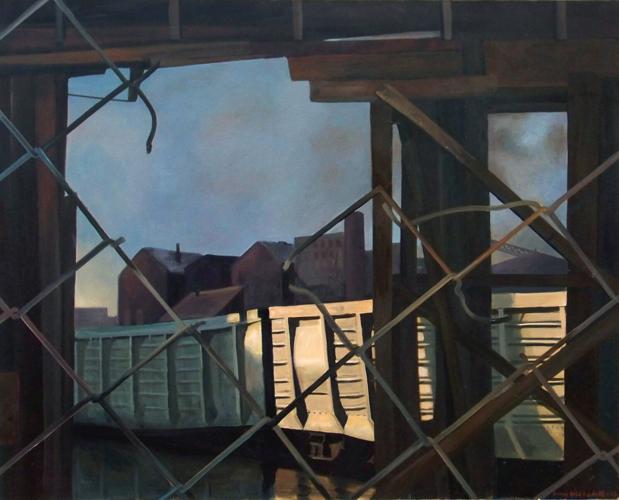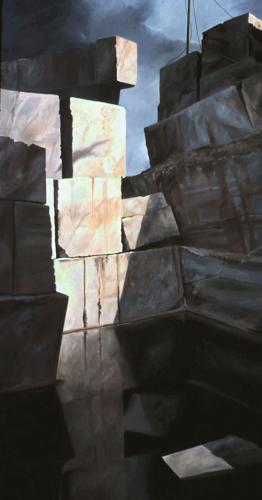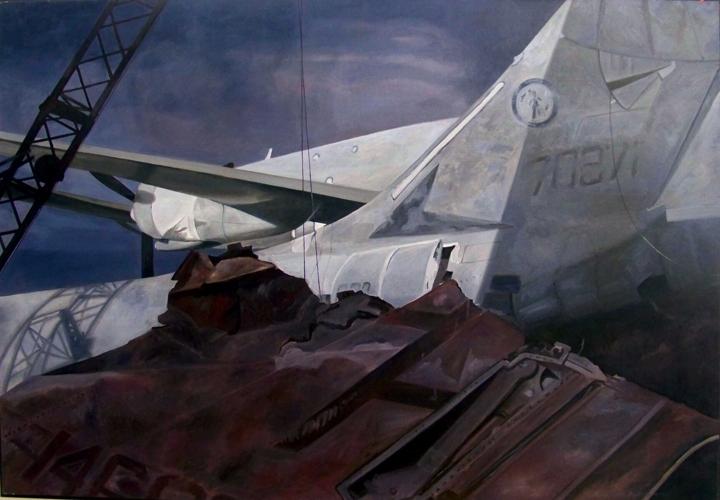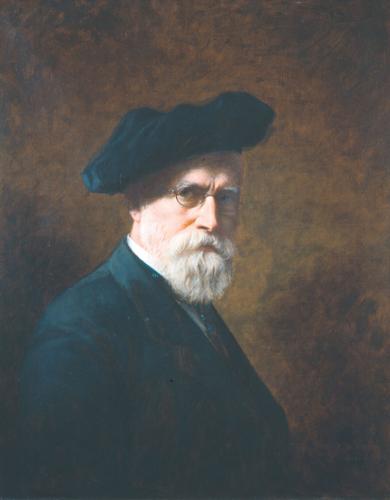A little more than two decades ago, poet Suzanne Nothnagle and the late artist Anna Held Audette (1938-2013) were invited to speak in New Hampshire at the regional conference of the Society for Industrial Archaeology, an organization dedicated to study, appreciation and preservation of our industrial and technological past.
In Nothnagle’s poems, workers shut down when their industries moved on, the human price of progress, unsentimentally had voice. In Audette’s paintings were landscapes of remains of industrial decline — an abandoned blast furnace, shuttered factories, rusting machines.
The conference was the first time Nothnagle and Audette met, but the two artists immediately recognized their shared focus. Along with friendship that grew from their meeting, they later collaborated on a book. “Ruins — Poems and Paintings of a Vanishing America” was published in 2013.
Beginning Friday, the T.W. Wood Gallery presents “Ruins — Poems and Paintings of a Vanishing America” in its Nuquist Gallery. The exhibition features 10-large scale paintings by Audette, including the originals of several in the book, and a selection of Nothnagle’s poems from that volume.
The exhibition’s opening coincides with the gallery’s gala celebration of Thomas Waterman Wood’s 200th birthday. The gallery’s founder and benefactor, Wood was born in Montpelier on Nov. 12, 1823. The 19th century master artist, known especially for his genre paintings, founded the Wood Gallery of Art in 1895, giving an initial 42 paintings, watercolors and etchings in trust to the residents of Montpelier. Wood subsequently left much of his estate to the gallery when he died in 1903.
The 200th birthday gala, 4 to 8 p.m. Friday, Dec. 1, features a gallery talk by board member and artist Phillip Robertson about Wood and the permanent collection. The gala and “Ruins” opening also features a poetry reading by Nothnagle. In the Wood’s Hallway Gallery, the annual Holiday Market and scholarship fundraiser also opens Dec. 1.
“Ruins — Poems and Paintings of a Vanishing America” is curated by Kate Ruddle, T.W. Wood Gallery exhibitions and adult education manager.
Audette, who focused on printmaking through first decades of her professional career, was a longtime professor at Southern Connecticut State University. Based in Connecticut — her main studio was there — she had lifelong southern Vermont ties. Her parents had a small farm in Marlboro, and she and her husband Louis later had their own home there.
In 1980, Audette embarked on a new direction in her work, drawing machinery, industrial shapes and abandoned cars. She then turned to painting with an eye to structures, machines, vehicles that had been well designed and constructed in their day but had succumbed to time and neglect. These modern ruins became a theme she explored for the rest of her life.
Audette’s paintings have qualities of precisionist art, with sharp focus and realistic detail and dynamic composition. We see her subjects often from unexpected angles — through a failing fence, up close to junkyard scrap.
In the preface to Nothnagle and Audette’s book, Audette says that modern ruins, “remind us that, in our rapidly changing world, the triumphs of technology are just a moment away from obsolescence. Yet these remains of collapsed power have a strength, grace and sadness that is both eloquent and impenetrable.”
Audette’ work is in the National Gallery of Art, the Rijksmusueum and other museums as well as private collections.
Nothnagle, who lives in Hartland, focuses on the human side of industry, the people who labored in factories now closed at jobs that have disappeared.
“The world of work and making things has always fascinated me,” she said. “Often those who make are unnamed and forgotten. My main concern with this series of poems was to try to keep myself out of them. The world of the manufacturing shops was complete with or without me.”
Nothnagle ran a small machine shop for 27 years, making a mitering hand tool whose design dates from the late 1800s. She notes that many traditional carpenter’s hand tools are no longer made.
Nothnagle’s poetry has been published in The Anthology of New England Writers, Connecticut Review and other publications. Beside poetry, Nothnagle wrote an oral history of the machine tool industry in Springfield and Windsor and one of the Connecticut River. She has also worked with the American Precision Museum in Windsor.
T.W. Wood Gallery T.W. Wood Gallery presents “Ruins – Poems and paintings of a Vanishing America,” paintings by Anna Held Audette and poetry of Suzanne Nothnagle, through Jan. 20; Holiday Market, through Dec. 28, at the Center for Arts and Learning, 46 Barre St. in Montpelier. Hours are noon to 4 p.m. Tuesday-Saturday; admission is free; call 802-262-6035 or go online to www.twwoodgallery.org The T.W. Gallery commemorates the 200th birthday of Thomas Waterman Wood with a gala celebration with the exhibition openings 4 to 8 p.m. Friday, Dec. 1, with gallery talk, poetry reading and refreshments.
Building by Suzanne Nothnagle When the jobs went away they sold the machines for scrap, left the buildings they couldn’t put up fast enough, empty home to pigeons, kids looking for adventure. Windows broken, trees growing up, roof letting go people say it’s an eyesore. It is now, but, you should have seen it, should have heard it, when all our tomorrows were made right here.






